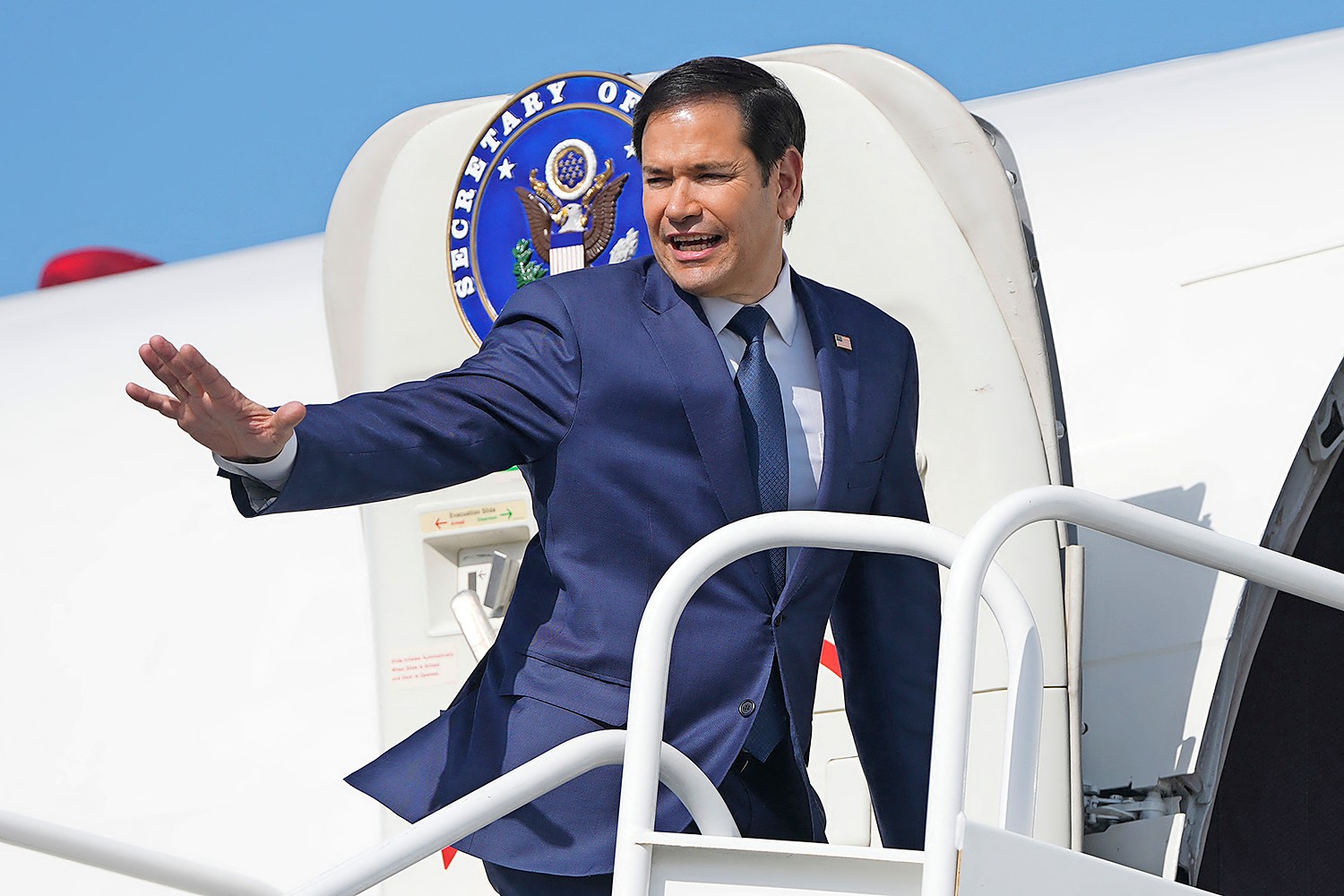Marco Rubio had a very busy first week as secretary of state and national security adviser. A White House visit by the new Canadian prime minister, Mark Carney. Tiffs with the new German government over the determination that the opposition party was extremist. A trade deal with Britain. An escalating conflict between India and Pakistan, both nuclear powers. A ceasefire with the Houthis. And the first real talks with China on the trade war.
Secretary of state Rubio spent the week dealing with foreign governments on these issues. He castigated the Germans for curtailing free speech. He called on his counterparts in New Delhi and Islamabad to de-escalate the war. And he took a call from his Israeli counterpart wondering why they weren’t informed about the Houthi ceasefire and why there was no Houthi commitment to stop firing on Israel.
National security adviser Rubio spent the week briefing the president on the next round of talks with Iran about its nuclear programme, the Houthi missile that hit Tel Aviv, Israel’s latest escalation in Gaza and progress on trade negotiations. He also had to prepare the president for the Carney visit, phone calls with foreign counterparts and Donald Trump’s first overseas visit to the Gulf this week.
These key national security positions are among the most demanding jobs in the world. Doing either requires superhuman effort; doing both is practically impossible – except, perhaps, when Trump is president.
In the 78 years since both roles have existed, only one person has held them simultaneously: Henry Kissinger. As Richard Nixon’s national security adviser, Kissinger had already gained a great deal of power. He shared his boss’s penchant for secrecy, and both were fine on acting without telling other administration officials. Thus Kissinger negotiated with the Soviet Union on nuclear weapons and engineered the opening with China without involving the secretary of state. When Nixon appointed him to that position in 1973, it in many ways formalised a process that had been developing for some time.
The circumstances for Rubio taking on both roles were very different. In this case the issue was Mike Waltz, the incumbent national security adviser.

Waltz was never a good fit for the Trump White House. Though a fierce defender of Trump during the campaign, Waltz came from the Reagan wing of the Republican party. He had voted to arm Ukraine and castigated Russia for its invasion. He was a hawk on Iran and China. Trump shared none of these perspectives.
More troubling was Waltz’s failure to understand that what Trump was looking for was not the best advice – whether to bomb Iran, sanction Russia more or squeeze China, all of which Waltz advanced – but complete fealty to advancing his instincts. Although Waltz’s foolish error of adding a journalist to a private Signal chat would further weaken his standing, his position inside the administration had weakened for some time.
One indication came when far-right activist Laura Loomer convinced Trump to fire several people on Waltz’s staff (some of whom had served him in Congress). Another was stories suggesting Waltz was falling foul of Trump’s chief of staff, Susie Wiles. The end came when reports surfaced that Waltz had sought to coordinate with his Israeli counterpart to pressure Trump to OK a strike against Iran’s nuclear programme.
If Waltz wasn’t a good fit, appointing Rubio to the role on an interim basis was certainly out of the ordinary. But it shouldn’t have been a surprise.
Newsletters
Choose the newsletters you want to receive
View more
For information about how The Observer protects your data, read our Privacy Policy
Rubio has been a tough defender of Trump. He’s modulated his hawkishness to align with the president
Rubio has been a tough defender of Trump. He’s modulated his hawkishness to align with the president
Since running against Trump for the 2016 nomination, Rubio worked hard to be in the president’s good graces. He’s been a tough defender of Trump’s policies. He’s modulated his own hawkishness to align more clearly with Trump. And he’s impressed the president with his ability to get things done.
While occupying both roles should be beyond the abilities of a single person, that might not be the case for Rubio. The reason is Trump. Power in this White House is singularly concentrated in the Oval Office and lies solely with its current occupant. Formally, that is of course always the case. But while in previous administrations, top officials and cabinet members had influence, that was because the president valued their input and saw benefit in an open policy process.
Trump is different. He governs on instinct, based on a few strongly held core beliefs – including that other countries have long taken advantage of the US and that tariffs are the best way to reverse this course. Trump doesn’t like a formal process or detailed briefings or even independent advice. He likes people who get things – his things – done.
Marco Rubio is, at least for now, that person. “When I have a problem,” Trump said shortly before announcing the interim appointment, “I call up Marco. He gets it solved.”
Ivo Daalder is CEO of the Chicago Council on Global Affairs and a former US ambassador to Nato
Photographs Mark Schiefelbein/AFP/Getty, Brendan Smialowski/AFP
